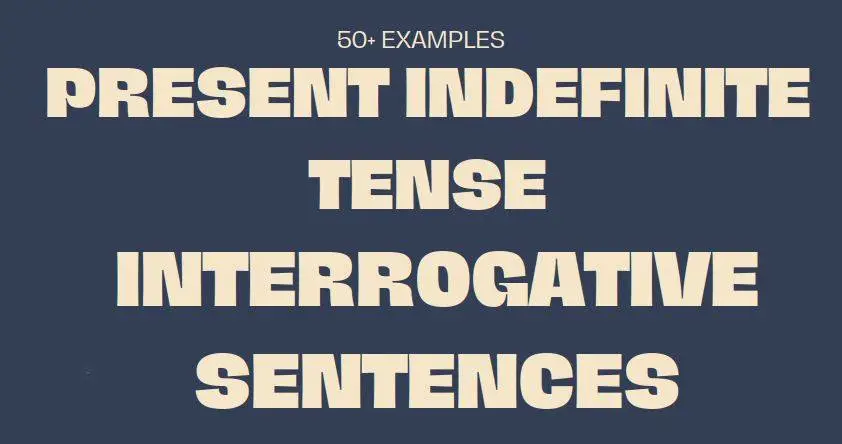In the intricate tapestry of language, interrogative sentences serve as the threads of curiosity, weaving through conversations, interviews, and even writing. In this article, we will embark on a journey to unravel the mysteries of Present Indefinite Interrogative Sentence, delving into their structure, function, and the pivotal role they play in effective communication.
Understanding Interrogative Sentences
Basic Sentence Structure
At the foundation of interrogative sentences lies a unique structure that sets them apart. They are designed to inquire, to seek answers, and to open doors to knowledge. Subject-verb inversion is the first clue, where the subject and verb swap positions. This inversion is like a linguistic spotlight, directing attention to the heart of the question.
Use of Question Words
Question words, also known as interrogative words or wh-words, are the tools of interrogation. They are the who, what, where, when, why, how, which, and whose that unlock the doors to information.
Different Types of Interrogative Sentences
a. Yes/No Questions
These questions, as the name suggests, prompt a simple ‘yes’ or ‘no’ answer. They are concise and direct, making them ideal for seeking confirmation or clarification.
b. Wh-Questions
Wh-questions are the investigators of the sentence world. They dive deep into the details and demand comprehensive responses.
Role of Interrogative Sentences in Communication
Interrogative sentences are the lifeblood of conversation, enabling us to gather information, express curiosity, and engage in meaningful dialogue. They are the keys that unlock the doors to knowledge.
Forming Present Indefinite Interrogative Sentence
Subject-Verb Agreement
Precision is paramount. The subject and verb must harmonize, aligning in number and person. This ensures grammatical coherence and avoids confusion.
Auxiliary Verbs: “Do” and “Does”
These auxiliary verbs are the architects of interrogative sentences. They provide the framework upon which the questions are built, injecting them with life and purpose.
Word Order in Interrogative Sentences
In the realm of interrogative sentences, word order reigns supreme. The intricate dance of subject, auxiliary verb, and main verb orchestrates the perfect question.
Examples of Present Indefinite Interrogative Sentence
To truly grasp the art of constructing these sentences, let’s explore real-life examples that showcase their versatility and importance.
Usage of Present Indefinite Interrogative Sentence
Seeking Information
Interrogative sentences are the compass of curiosity, guiding us in our quest for knowledge. They are the tools we use to seek answers to our myriad questions.
Examples in Everyday Conversations
From casual chit-chat to serious discussions, interrogative sentences are the threads that bind our conversations together.
Making Polite Requests
Politeness is an art, and interrogative sentences are its brushes. They allow us to make requests with grace and consideration.
Appropriate Language and Tone
Crafting interrogative sentences requires not just linguistic finesse but also an acute awareness of the situation and audience.
Offering Suggestions
Suggestions often come disguised as questions, and interrogative sentences allow us to present our ideas and proposals in a non-imposing manner.
Encouraging Input from Others
Interrogative sentences are the facilitators of collaboration, inviting others to contribute their thoughts and opinions to the discourse.
Expressing Surprise or Disbelief
Sometimes, questions convey more than curiosity—they express astonishment, doubt, or wonder. Here, tone and non-verbal cues play a pivotal role.
Common Question Words
What, Where, When, Why, Who, How, Which, Whose
These question words are the Swiss Army knives of interrogation, each with a specific purpose and a unique ability to unveil information.
Tips for Asking Effective Questions
Clarity and Conciseness
Precision is key. Clear and concise questions are more likely to elicit informative responses.
Avoiding Leading Questions
Leading questions can inadvertently bias responses. Learn to frame questions neutrally to gather unbiased information.
Open-Ended vs. Closed Questions
Understanding when to use open-ended questions that encourage elaboration and when to employ closed questions for specific answers is an art.
Active Listening Skills
Effective questioning is not just about asking; it’s about listening actively to the responses, probing further when necessary.
Common Mistakes to Avoid
Double Negatives
The subtleties of negation can trip up even seasoned questioners. Avoiding double negatives is vital for clarity.
Misplaced Auxiliary Verbs
A misplaced auxiliary verb can alter the entire meaning of a question. Attention to detail is paramount.
Confusing Word Order
A misplaced word can transform a question into a statement. Mastering word order is crucial.
Ambiguous Questions
Ambiguity leaves room for misinterpretation. Crafting questions with utmost clarity is an ongoing skill.
Practice Exercises
Rewriting Statements as Interrogative Sentences
Transforming declarative sentences into interrogative ones is a fundamental exercise in mastering this art.
Forming Questions Using Question Words
Putting question words to use and practicing their nuances is essential.
Identifying Mistakes in Given Sentences
Sharp eyes and a keen ear for language help in spotting errors in interrogative sentences.
Using Present Indefinite Interrogative Sentence in Writing
Journalism and Interviews
In the realm of journalism, interrogative sentences are the tools of investigation, driving inquisitive reporting.
Market Research and Surveys
Surveys and market research heavily rely on well-crafted interrogative sentences to gather data and insights.
Academic Research and Surveys
In academia, interrogative sentences fuel research inquiries, shaping the course of scholarly investigations.
Creative Writing and Storytelling
The art of storytelling often hinges on the questions posed within narratives, engaging readers’ curiosity and empathy.
Politeness and Etiquette in Interrogative Sentences
Formal vs. Informal Language
Tailoring your language to the formality of the situation is a mark of linguistic finesse.
Appropriate Language in Different Situations
Understanding when to employ polite language or casual conversation is essential for effective communication.
Cultural Considerations
Different cultures have unique norms for asking questions. Being culturally sensitive is paramount.
Conclusion
In the tapestry of language, interrogative sentences are the threads of inquiry, curiosity, and communication. Proficiency in crafting and using Present Indefinite Interrogative Sentence is not just a linguistic skill, it’s a tool for unlocking the doors to knowledge and understanding. Embrace the art of questioning, practice it diligently, and watch your communication skills flourish.





